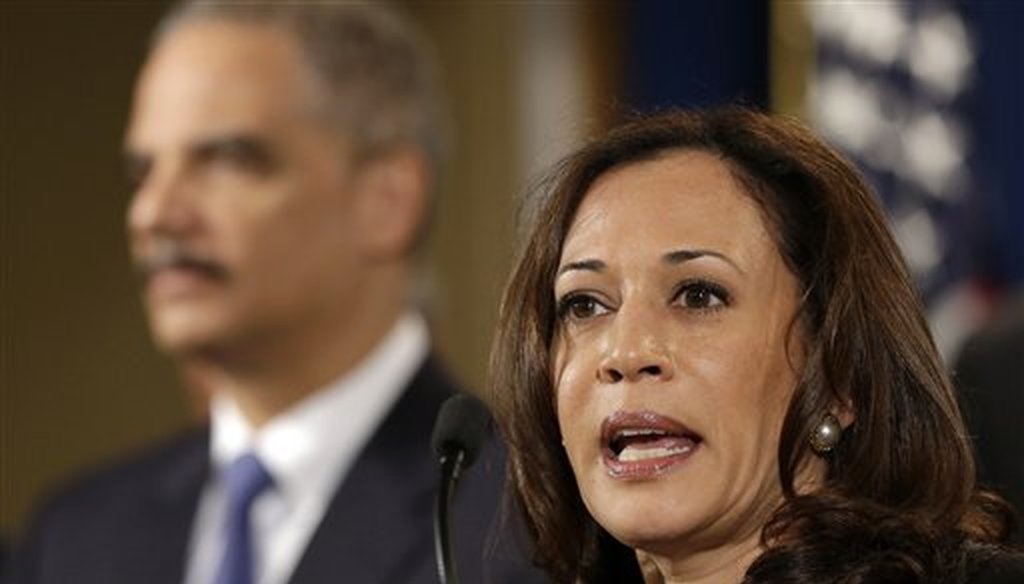Get PolitiFact in your inbox.

California Attorney General Kamala Harris speaks at the Justice Department in Washington, D.C., in 2013. (AP Photo/Jacquelyn Martin)
If Your Time is short
-
Sen. Kamala Harris has repeatedly claimed she “took on the big banks” as California attorney general following the foreclosure crisis.
-
We found she played a central role in reaching the $25 billion National Mortgage Settlement to provide relief to homeowners.
-
Harris also reached a separate $12 billion California agreement.
-
Additionally, Harris pushed for the California Homeowner Bill of Rights in 2012, considered the nation’s strongest foreclosure protection law at the time.
-
Critics, however, contend that Harris was not aggressive enough in prosecuting bank executives.
-
Also, some critics say the amount of relief was inadequate and failed to keep many Californians in their homes.
During her speech accepting the nomination to be Joe Biden’s running mate, Sen. Kamala Harris didn’t spend much time — at all — detailing her record as a California prosecutor.
Harris did, however, repeat a line during her Democratic National Convention address that’s become standard in her stump speeches both in the Golden State and now on the national stage:
"I took on the biggest banks," Harris said at the convention last week.
She was referring, in part, to the deal she struck with some of the nation’s largest financial institutions in 2012 as California attorney general to provide relief for homeowners facing foreclosure during the subprime mortgage crisis.
Harris has repeated this claim at high-profile points throughout her career: While running for U.S. Senate in 2016, during her January 2019 speech kicking off her own presidential bid before a crowd of thousands in Oakland and then two months later on Jimmy Kimmel Live!:
"I took on the five big banks of the United States when we were fighting for the homeowners of California, and by extension the nation, around the foreclosure crisis and when they were basically stealing from homeowners around these predatory mortgage practices."
Given the significance of this turbulent period, we wanted to know more about Harris’ contention that she tackled these problems head on. What, exactly, was her role as attorney general "taking on the big banks," how successful was she and did she go far enough?
Background On California’s Foreclosure Crisis
In California and across the nation, the foreclosure crisis was devastating. Nearly 10 million homeowners lost their homes to foreclosure sales between 2006 and 2014, according to research by Marketplace.
As home values plummeted, mortgage payments ballooned, often due to predatory lending practices. Homeowners found themselves "under water," owing hundreds of thousands of dollars more than the value of their homes.
Then, as the wider economy collapsed, many lost work and the ability to stay in their homes. Some took a loss through short sales, others simply abandoned their homes, creating ghost towns in new suburban tract neighborhoods. Foreclosure relief funds were still years away.
The ripple effects of the mortgage crisis and ensuing Great Recession are still felt. Millions who lost their homes never returned to homeownership, denying families the chance to build wealth for future generations.
How Did Kamala Harris ‘Take On The Big Banks’?
Through interviews with housing policy experts and consumer advocates, and reviewing news articles and documents over the past decade, we found Harris did play a central role in securing billions of dollars in relief funds and new protections for California homeowners facing foreclosure. She’s been widely praised for these achievements.
We also found, however, that much of the mortgage relief money was spent on efforts that did not keep Californians in their homes. Additionally, consumer advocates told us not enough was done to ensure low-income households and communities of color received the help they needed.
Finally, critics say Harris should have done more to prosecute the financial industry executives many blame for starting the crisis.
Harris’ campaign spokesperson did not respond to requests to discuss this story.
Harris’ Role In The National Mortgage Settlement
In February 2012, Harris and 48 other state attorneys general reached the National Mortgage Settlement. The $25 billion deal required the nation’s five largest mortgage servicers — Wells Fargo, JPMorgan Chase, Citi, Bank of America and Ally/GMAC — to provide mortgage assistance for homeowners facing foreclosure.
During negotiations, consumer advocates such as Kevin Stein worried Harris would take an initial and lower offer from the banks. Only California and New York had yet to sign on.
The groups saw the amount on the table, described later by Harris as between $2 billion and $4 billion for California, as inadequate.
Despite pressure from other states and the White House to settle, Harris famously walked away, a decision she speaks about frequently and writes about in her book The Truths We Hold.
When she returned to the table months later, Harris helped secure the $25 billion national settlement along with a separate $12 billion deal called the California Agreement.
Aid delivered under the California deal would eventually grow to $18 billion. Harris often describes the total as $20 billion in relief for California, which includes nearly $2 billion from the national deal. She described securing the assistance as "a tremendous victory for the people of California."

SOURCE: California Attorney General’s Office, California Monitor report, By the Numbers: Mortgage Relief Across California, Sept. 24, 2013
The negotiations won Harris praise from the likes of Massachusetts. Sen. Elizabeth Warren, who appeared in a campaign ad in 2016 in which she endorsed Harris for U.S. Senate and called her "fearless."
"As the fraud was being uncovered, many of the AGs were yelling ‘Settle, settle, settle.’ They just wanted to get their hands on the money. … [Harris] was the one who said ‘No, we have to do better,’" Warren told the Los Angeles Times in 2016.
"She stood firm. She got more for the state," added Stein, deputy director of the California Reinvestment Coalition, which works to ensure banks invest in communities of color and low-income communities in an equitable manner.
The California Agreement required the three largest mortgage companies — Bank of America, JPMorgan Chase, and Wells Fargo — to provide relief for California homeowners under more stringent requirements than the national deal.
‘The Banks Are Running The Government’
While the agreements Harris reached with the banks promised more help, some economists and advocates for borrowers said they fell far short of what was needed both in the state and nationally given the scale of the crisis.
They also said too much of the aid came in the form of short sales and forgiveness of second mortgages, instead first mortgage reductions, the kind most likely to keep a borrower in their home.
"It just shows you that the banks are running the government," Bruce Marks, founder of Neighborhood Assistance Corp. of America, a major housing counseling group, told the Los Angeles Times in 2013. "There’s virtually no benefit to borrowers, and yet you give the banks credit for short sales and getting second liens wiped out — something they were going to have to do anyway."
Under the California Agreement, approximately 84,000 California families received more than $9.2 billion in first- and second-mortgage principal reduction, according to a September 2013 analysis conducted for the attorney general’s office on how the relief funds were spent. A slightly larger total, $9.24 billion, was spent on short sales, with the report noting: "The reality is that not every family can keep its home."
That’s because many had lost jobs and simply needed to move on from their massive debt, said Carolina Reid, a faculty research advisor at UC Berkeley’s Terner Center for Housing Innovation.
"They were not going to stay in that home. So, a short sale is better than an outright foreclosure," added Reid, who was part of the team that helped review bank performance for the attorney general’s office following the California Agreement.
Others say the deals reached by Harris and other attorneys general were woefully insufficient. Christopher Thornberg, founding partner of Beacon Economics, a research and consulting firm in Los Angeles, told Stateline in 2013 that California's share of relief aid was "chump change" in a state that has a $1.5 trillion economy. The settlement, he added, simply allowed politicians "to thump their chest and rail against the big evil banks."
Relief Didn’t Reach Those Hardest Hit By The Foreclosure Crisis
Housing and consumer experts say predatory lending practices and the resulting foreclosure crisis disproportionately hit communities of color and low-income households first and the hardest.
While they did not single-out Harris, who was elected attorney general in 2010 as the crisis was well underway, they said the assistance she helped secure came too late for many.
"By the time policy makers were thinking about homeowner relief and talking about the settlement, a significant share of Black and Latinx households had already lost their homes to foreclosure. That’s because they were the first impacted," Reid said.
Stein, the consumer advocate, added there wasn’t much data to track efforts to help these communities.
"The neighborhoods that needed it most, it wasn’t clear that they were getting relief," he said.
Governments didn’t start paying attention to the crisis, Reid added, "until they saw the foreclosure crisis extend to white households."
"So, absolutely, we could have done so much more to ensure that communities of color, lower-income households wouldn’t have been so badly impacted by the foreclosure crisis," she said.
Harris’ Role In Passing The California Homeowner Bill of Rights
Along with helping secure the financial settlements, Harris is credited with helping push through the California Homeowner Bill of Rights in 2012.
Stein said the protections in the bill set a national model and, at the time, served as "the strongest foreclosure prevention law in the country."
It provided homeowners in distress with a single point of contact at a bank, reducing the stress and duplication of working with multiple representatives. The bill also required that homeowners receive fair consideration for a loan modification and allowed them to respond if denied.
Finally, and most importantly, Stein said the bill allowed homeowners to sue banks if their rights under the bill were violated.
"That was really one of the first, if not the first time, you had clear consequences for banks’ malfeasance and misconduct," Stein added, noting some foreclosures were stopped as a result. "We think it served a really important deterrent value. Banks then kind of took notice and realized that they needed to comply with the Homeowner Bill of Rights or else they would get sued."
Stein said Harris fully backed the bill after it had twice failed in the Legislature. It was signed into law by then-Gov. Jerry Brown in July 2012 and went into effect Jan. 1, 2013.
Harris "became the face of the Homeowner Bill of Rights and helped push it through," he said.
Why Didn’t Harris Go After Bank Executives?
Looking back at the mortgage crisis, some have raised questions about why Harris didn’t go after bank executives more aggressively. They point to a 2012 investigation by the attorney general’s office that found OneWest Bank took part in "widespread misconduct" when foreclosing homes, as reported by the Intercept. The bank was headed at the time by now Treasury Secretary Steven Mnuchin, who disputed the findings.
Last year, Ian Sams, a campaign spokesman for Harris told CNBC the following:
"There was no question One West conducted predatory lending, and Senator Harris believes they should be punished. Unfortunately, the law was squarely on their side and they were shielded from state subpoenas because they’re a federal bank," Sams wrote in an email.
Despite that challenge, CNBC noted Harris’ office still could have filed a civil enforcement action against the bank, but chose not to.
Looking ahead, advocates such as Stein say they’re worried another housing crisis is coming given the huge loss of jobs during the COVID-19 pandemic.
Government leaders, from Harris to President Donald Trump, will again play pivotal roles in deciding what kind of relief to secure, and how that assistance reaches those most in need.
PolitiFact California is fact-checking the claims Harris makes about her record in the state while she campaigns as Biden’s VP pick. Suggest a fact check at [email protected], or contact us on Twitter or Facebook.
Related:
What Kept Kamala Harris So ‘Cautious’ As California’s Attorney General?
Kamala Harris: Criminal justice reformer, or defender of the status quo? The record is mixed
Kamala Harris Is Biden's VP Pick. Here's A Closer Look At Her Record In California.
Harris did not call Biden a racist during her busing attack
Did Kamala Harris flip-flop on independent probes of police shootings?
Our Sources
Kamala Harris, Democratic National Convention speech, Aug. 19, 2020
Kamala Harris, appearance on Jimmy Kimmel Live!, March 20, 2019
Kamala Harris, presidential campaign kick-off speech, January 27, 2019
Kamala Harris for U.S. Senate, "Fearless" campaign ad, May 2016
Kevin Stein, deputy director of the California Reinvestment Coalition, video interview Aug. 20, 2020
Carolina Reid, faculty research advisor, UC Berkeley’s Terner Center for Housing Innovation, video interview Aug. 24, 2020
Maeve Elise Brown, executive director, Housing and Economic Rights Advocates, email interview, Aug. 22, 2020
California Attorney General’s Office, California Monitor report, By the Numbers: Mortgage Relief Across California, Sept. 24, 2013
California Attorney General’s Office, California Homeowner Bill of Rights Signed into Law, July 11, 2012
National Mortgage Servicing Settlements, website, accessed August 2020
Marketplace, Divided Decade: How the financial crisis changed housing, Dec. 17, 2018
Los Angeles Times, Mortgage relief didn’t help many keep their homes, critics say, Sept. 25, 2013
CNBC, Kamala Harris’ complicated history with Wall Street will come under scrutiny in the 2020 race, Jan. 26, 2019
The Intercept_, Treasury Nominee Steve Mnuchin’s Bank Accused of "Widespread Misconduct" In Leaked Memo, Jan. 3, 2017
Stateline, States Used Mortgage Settlement Money to Balance Budgets, Oct. 8, 2013
Los Angeles Times, $25-billion foreclosure settlement was a victory for Kamala Harris in California, but it wasn’t perfect, Oct. 16, 2016


















































